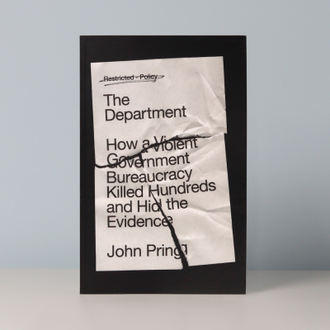The Department: How a Violent Government Bureaucracy Killed Hundreds and Hid the Evidence

The Department: How a Violent Government Bureaucracy Killed Hundreds and Hid the Evidence, by John Pring. Published by Pluto Press.
Disabled people consider this book so important that they crowdfunded the money to pre-order 650 copies and have them delivered to every MP in Parliament. It is a vital record of disturbing events, and an example of outstanding investigative journalism. The author has been tireless in his efforts to unearth the evidence, whilst being extremely sensitive and considerate towards the families of the victims. At a time when public trust in the media is understandably low, this book stands as an example of how journalism can be not just a noble profession, but also a compassionate one.
John Pring has been writing about disability issues for 25 years, and launched the Disability News Service (DNS) in 2009. As the years passed, one issue became more and more pressing - the treatment of disabled people by the Department for Work and Pensions (DWP). For many people unable to work due to chronic illness or disability, the DWP is their only source of income, so its decisions can have a huge impact on their lives. And when that impact is negative, it can be literally a matter of life or death.
'The Department' analyses and lays out with impressive clarity how, over the course of decades, the DWP became a feared presence in the lives of many disabled people. Beginning with the Thatcher government, and with the influence of private insurance companies, politicians started to consider how they could, "pick away at the threads of the safety net." The process of claiming and trying to survive on disability benefits became increasingly difficult and distressing, particularly for people with a severe mental illness.
Gradually, reports of deaths began to be linked to the DWP, as its approach to disabled claimants became more harsh. After 2010, under a government pursuing austerity and with a mission to 'reduce welfare dependency', this process intensified.
From 2010 to 2016 Iain Duncan Smith was Secretary of State at the DWP. During this period some Remploy workplaces, which provided sheltered employment for disabled people, were closed, and the Welfare Reform Act 2012 increased the sanctions which could be applied to unemployed disabled people. A new, more mechanistic system of assessing people's eligibility for out of work disability benefits was rolled out to existing claimants, despite a coroner's 'prevention of future deaths' letter. The coroner had judged that being found fit for work using this assessment, and having his appeal rejected, had triggered the suicide of Stephen Carre (41).
An academic study later found that, just for the three years between 2010 and 2013, this Work Capability Assessment was associated with an extra 590 suicides in England, and many more incidents of self-harm.
In 2016, the United Nations Committee on the Rights of Persons with Disabilities found that the UK government, mainly the DWP, was guilty of 'grave' and 'systematic' violations of disabled people's rights. Since then, deaths have continued, more coroners' letters have been sent, but the DWP has gone to some lengths to conceal its failings. Indeed, soon after this book was published, the author established, via a Freedom of Information request, that the DWP had failed to appoint a chief medical adviser for more than five years, between 2017 and 2022 - all while making crucial decisions affecting the lives of people with chronic illness and disabilities.
Whilst this book's research into the political and bureaucratic details of events over decades is meticulous, it is the individual stories of the victims which make it so moving and so memorable. Their fragility, and the sheer effort involved in trying to stay alive from one day to the next, shines through the accounts of their lives, their deaths, and the heartbreaking notes that some of them left.
In recent years the tragic death of headteacher Ruth Perry has caused a change in the way Ofsted inspections work, and the Post Office scandal has been the subject of an extensive inquiry. The information contained in this book, and the deaths it documents, should create the political pressure to secure justice for the victims and radical changes to the way disabled benefit claimants are treated. If that doesn't happen, it will say much about society's attitude towards disabled people.
The Department: How a Violent Government Bureaucracy Killed Hundreds and Hid the Evidence, by John Pring
Published by Pluto Press: www.plutobooks.com/9780745349893/the-department/


















